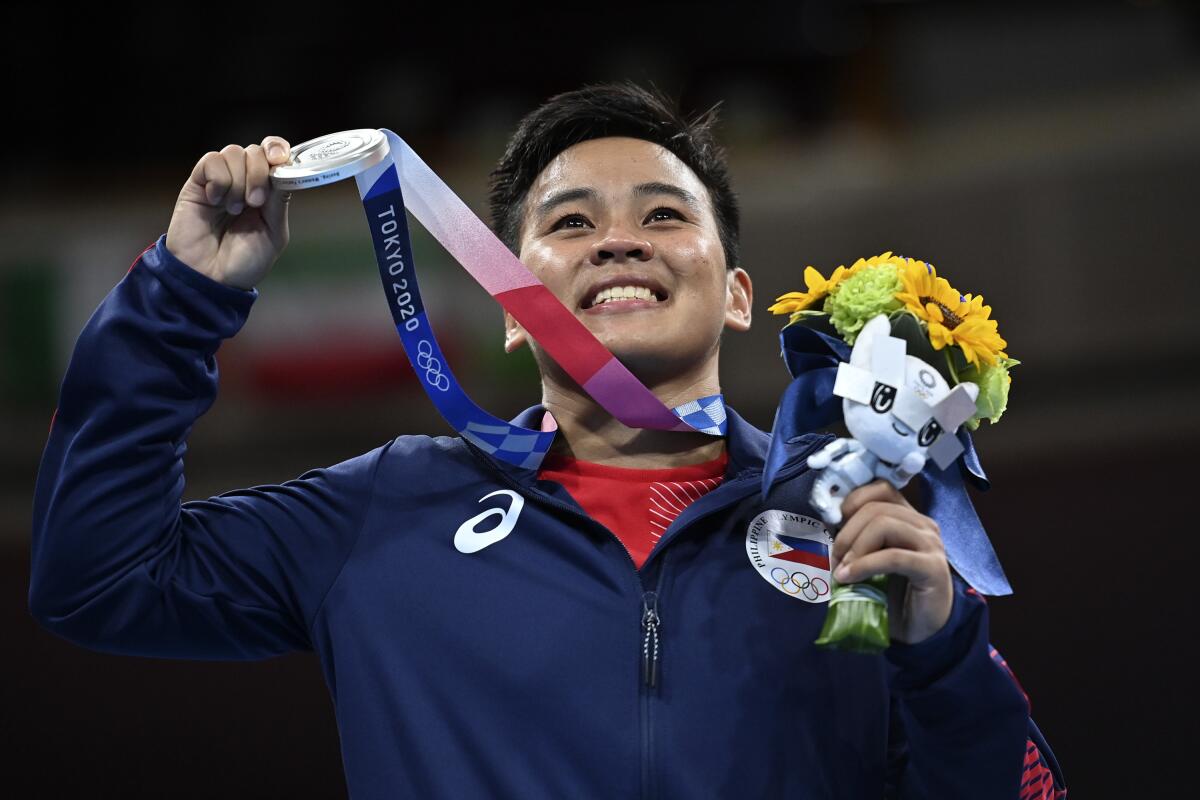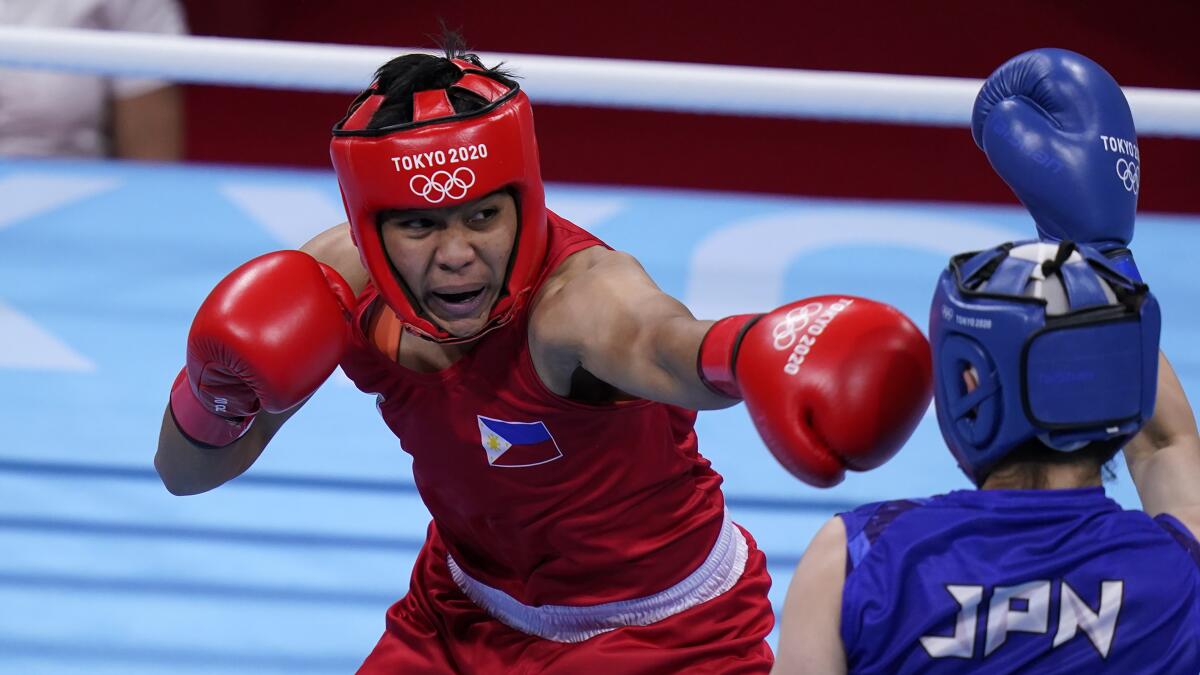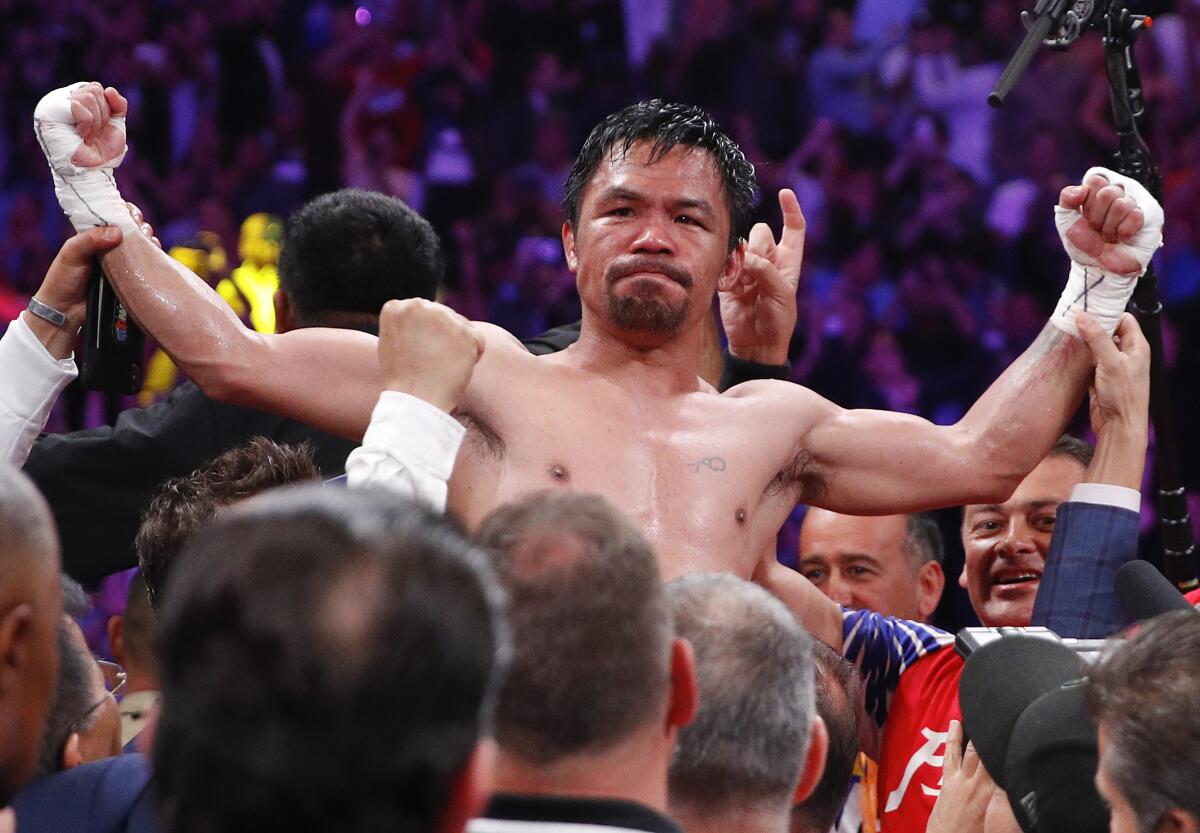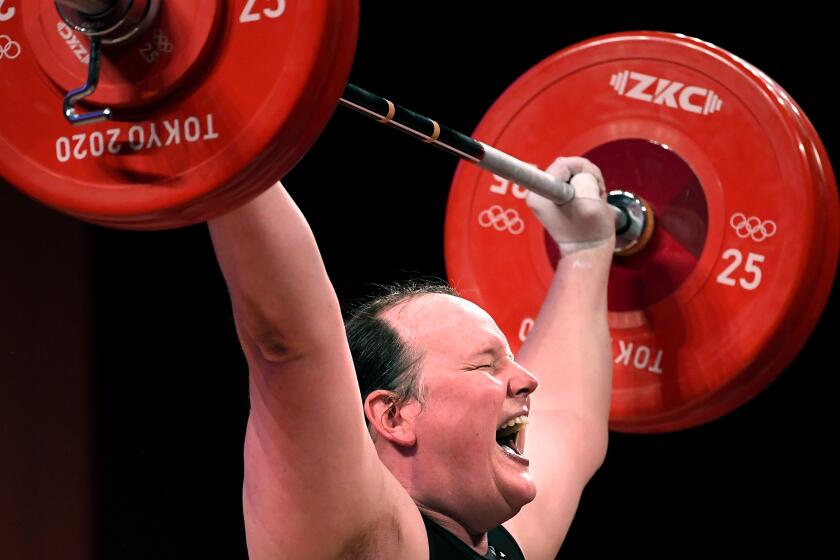The Philippines’ rich boxing history, revived by Manny Pacquiao, shines at Olympics

- Share via
TOKYO — As her opponent sobbed nearby in her coach’s arms, Nesthy Petecio remained in the ring and tugged on her left shoulder strap to draw attention to the Philippines flag on her red singlet.
With a small crowd of Filipino boxers and delegation members waving flags and chanting her name from the second deck of the Ryogoku Kokugikan Sumo Stadium, Petecio walked around punching the air in celebration.
She had won a silver medal, but she beamed as if it were gold, and an entire nation celebrated with her.
“This medal,” Petecio said, “is for my country.”
Laurel Hubbard, New Zealand weightlifter, is among the first openly transgender athletes to compete at the Olympics.
These are the No One Cares Games as far as boxing is concerned, remnants of the misguided efforts to include the likes of Manny Pacquiao in the Rio de Janeiro Olympics creating fields here that are a strange mishmash of pros and amateurs. The identity crisis has further diminished Olympic boxing, which experienced a sharp decline in popularity after Roy Jones Jr. was robbed in the gold medal match at the 1988 Games.
The wave of indifference never reached the shores of the Philippines, where Pacquiao and others have made the often-maligned sport a medium in which the best of its culture is showcased.
Filipinos think of basketball as their national sport, because their country is home to the second-oldest league in the world behind the NBA. But if basketball is their passion, boxing is their pride.
A disproportionate amount of the Philippines’ international sporting triumphs has come in boxing.
The country won its first-ever Olympic gold medal at these Games, by Hidilyn Diaz in weight lifting. But of the 12 medals the Philippines has ever won, six of them are in boxing, including Petecio’s silver Tuesday. Two more are guaranteed at these Games, as middleweight Eumir Marcial and flyweight Carlo Paalam have advanced to the medal rounds of the men’s competition.

The three medals would mark the first time the Philippines has won multiple medals in boxing in a single Olympic Games.
The importance of the sport to the Philippines dates back at least a century when boxing was first legalized.
The Philippines has produced 44 world champions in boxing’s professional ranks, starting with Francisco Guilledo in 1923. Super featherweight Flash Elorde was a champion in the 1960s. Then, of course, there was Pacquiao, who parlayed his fame as a champion in eight separate weight categories into a seat in the Philippines senate. Pacquiao remains an active fighter at 42; he will take on heavily favored Errol Spence later this month.
“I can’t say for others, but for me, it’s always been the back stories,” said Francis Ochoa, the sports editor of the English-language Philippines Daily Inquirer. “People feel inspired when they watch these guys punch their way out of poverty.”
Petecio, the women’s silver medalist, used to pick up chicken droppings with her siblings and sell them as fertilizer. Paalam, who advanced to the semifinals of the men’s flyweight tournament with a split-decision victory over 2016 gold medalist Shakhobidin Zoirov, was a landfill scavenger.

Filipinos especially saw themselves in Pacquiao, who lived on the streets of Manila as a teenager. They could relate to his efforts to learn English, how he would sometimes misspeak.
“I think he represents the resilience,” Ochoa said. “If you notice, it’s both bad and good for our culture that we can survive. We learn to smile when hardships come our way. You can see Manny the same way. Early on in his career, he wasn’t this perfect, clean-record boxer. He lost, he won. He was no Floyd [Mayweather]. But every time he stepped in the ring, he gave it his all. Filipinos are like that.”
Pacquiao was 37-2-1 when he challenged Marco Antonio Barrera in his first high-profile fight. He lost the first fight of his trilogy with Erik Morales. He arguably lost all four of his fights against Juan Manuel Marquez.
The current group of Olympic boxers grew up watching Pacquiao, who won his first world championship more than two decades ago.
“Manny Pacquiao is the very top idol for all Filipinos,” Paalam said.
Pacquiao has influenced an entire generation of boxers to not only follow him into the ring, but how to fight once they get there. Like Pacquiao, many of them place a priority on hand speed, including Paalam.
Marcial is promoted by Pacquiao and has trained at the same Wild Card Gym in Hollywood that is the base of Pacquiao’s operations.
Such talent was already in the country. What’s produced the record-breaking results, Philippine boxing coach Don Abnett said, is an increase in funding. The boxing program receives financial help from the Philippine Sports Commission and a sports foundation established by businessman Manny V. Pangilinan.
The groups have already received a return on their investments. And while U.S. standouts such as Keyshawn Davis and Duke Ragan are largely ignored in their home country, Petecio, Paalam and Marcial have become heroes in the Philippines, making the next generation of fighters aware of what’s possible, just as Pacquiao did for them.
More to Read
Go beyond the scoreboard
Get the latest on L.A.'s teams in the daily Sports Report newsletter.
You may occasionally receive promotional content from the Los Angeles Times.









